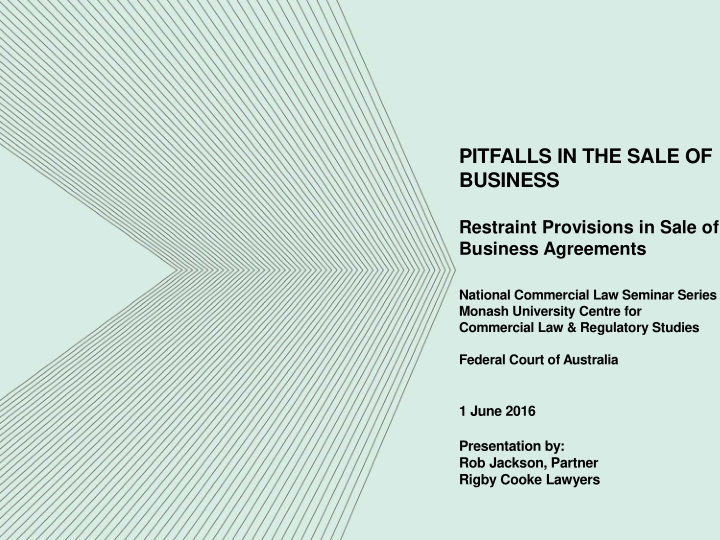



PITFALLS IN THE SALE OF BUSINESS Restraint Provisions in Sale of Business Agreements National Commercial Law Seminar Series Monash University Centre for Commercial Law & Regulatory Studies Federal Court of Australia 1 June 2016 Presentation by: Rob Jackson, Partner Rigby Cooke Lawyers
Key Principle – Protecting the Business Value If a purchaser has paid the agreed value for a business, generally a Court will uphold a post sale restraint. For example: • Tropeano v Riboni [2005] VSC 229, Gillard J at [86]: • “ The courts take a more liberal view to the restraint clause in contracts involving the sale of a business, than a restraint clause in a employer/employee relationship.” But reasonableness always relevant; • Then There Were Three Pty Limited v Douglas [2014] NSWSC 1011, Lindsay J at [136]: • “ They [i.e. the restraint provisions] travelled beyond what was necessary to protect the goodwill of the business purchased and sought, by broad prohibitions ….. and extended definitions, to provide a foundation for expansion of the business of the plaintiff [i.e. purchaser], and of AIS [i.e. vendor] under the control of the plaintiff, at the same time reserving a right to adjust the Purchase Price payable to the second defendant in light of actual experience.”
Franchise Agreements Franchising Code of Conduct 2015 regulates, and renders ineffective, insertion of excessive post-sale restraints upon franchise renewal • See clause 23 ‘ Effect of restraint of trade clause if franchise agreement not extended ’ Some cases, where restraints not upheld: • Murray Pest Management Pty Ltd v A & J Bliske Pty Ltd & Ors [2012] NTSC 5, Mildren J • BB Australia Pty Ltd v Karioi Pty Ltd [2010] NSWCA 347, Giles JA Macfarlan JA Sackville AJA
The public interest – what about the customer? Special Leave Refused, despite invitation to High Court to clarify law surrounding restraints • Miles v Genesys Wealth Advisers Ltd [2009] HCATrans 182, Hayne & Heydon JJ Tactics: • is an ex-customer willing to say they left the purchaser because of poor service? • are the goods/services specialised?
Employee Entrepreneurs Generally treated the same whether ex-employee works for another employer or sets up own business, for example: • Brunswick Family Dental Pty Ltd v Dr Enegd [2014] VSC 325, Macaulay J • Epichealth Pty Ltd v Yang [2015] VSC 516, John Dixon J Effective Drafting – permit ex-employee to compete, but have a fair mechanism to compensate for loss of custom, for example, where a three year restraint upheld: • Birdanco Nominees Pty Ltd v Money [2012] VSCA 64, Maxwell P, Redlich JA and Robson AJA
Purchaser and the restraint trilogy The purchaser must consider three contexts: • The vendor’s employees both those who do, and do not, transfer to purchaser o • Sale of business agreement • Ex-business owner as a new employee Key principle – ensure ex-business owner’s employment contract drafted at o least harmoniously, if not identically, with restraints in sale of business agreement
Is there a repudiation? • A repudiation by the purchaser may render restraint unenforceable • Bond & Anor v Rees Corporate Advisory Pty Ltd & Anor [2013] VSCA 13, Maxwell P & Tate JA at [47] per Tate JA “ The decisions in General Billposting and Kaufman have been interpreted as standing for the proposition that an employee’s post-employment restraint of trade obligations do not survive the termination of the employment contract where termination is effected by the employee accepting the employer’s repudiation of the contract. However, the reason why the general rule does not apply and why these obligations do not survive termination of the employment contract is not clear…. It may be …. that parties … will be presumed to have intended that the employee’s restraint of trade obligations will not survive termination of the contract where termination is effected by the employee accepting the employer’s repudiation of the contract. Alternatively, it may be that the enforcement of a restraint of trade clause in an employment contract following termination,…. is contrary to public policy. Further, it may be that the right of one contracting party to restrain the other contracting party from engaging in competitive conduct after the termination of the contract is not unconditionally acquired until the whole of the contract has been performed .” My underlining • Kaufman v McGillicuddy [1914] HCA 63 • Pet Tech Pty Ltd v Batson [2013]NSWSC 1954 at [15], Young AJ distinguished Tate JA’s obiter decision: “ The General Billposting doctrine seems to be being queried by academic and other lawyers at present time and indeed it was even considered to be on shaky grounds by the Victorian Court of Appeal but it is a doctrine that has been sanctioned by the High Court in the Kaufman case and I consider that as a single Judge I would need to follow it .”
Conclusion • Restraint of trade provisions must always be tailored Never a template! o • Sale of business restraint more likely to be upheld Rob Jackson, Partner, Rigby Cooke Lawyers Accredited Specialist Workplace Relations & Commercial Litigation Author: Post Employment Restraint of Trade , Federation Press, 2014 T: (03) 9321 7808 E: rjackson@rigbycooke.com.au
Recommend
More recommend